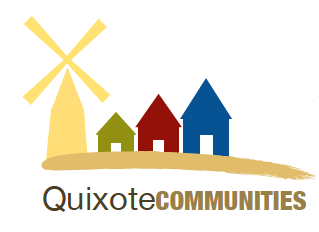WHO WE ARE
|
MISSION
We provide permanent supportive housing for people experiencing homelessness. We create and manage tiny home villages that foster community, encourage personal growth, and promote access to the care and services residents need. |
VISION
A community safely housed. A path to stability. A better quality of life. |
OUR VALUES
These values are designed to help Quixote Communities, as an organization, make thoughtful decisions that support our mission and vision:
- Foster Community: Build and foster community within our villages, as well as between our villages and organization and the broader community?
- Empowerment: Encourage the growth and wellbeing of our residents, staff, Board, and organization.
- Sustainability: Have our actions sustained over time from a financial, social, personnel, and environmental perspective.
- Public Education: Contribute to public education about, and further our advocacy concerning, homelessness, addiction, mental health, and the needs of our residents?
- Equity and Inclusion: Promote equity and inclusion, both internally and externally, that strives to dismantle historical systemic barriers for marginalized populations, particularly in the homeless community?
HISTORY
CAMP QUIXOTE
Camp Quixote started in Olympia, Washington in 2007, where a group of people experiencing homelessness and their activist supporters, the Poor People’s Union, set up an encampment on a downtown city lot. Their camp was in response to a city ordinance that severely restricted the use of sidewalks (aka criminalizing homelessness). The camp was being threatened with eviction and asked the local Olympia Unitarian Universalist Congregation for sanctuary on their campus. It was a huge decision for the congregation and luckily, they voted yes, and that's what started the 6 year journey for Camp Quixote. It's a faith-based organization's right to offer sanctuary on their property, but the city required some stipulations. First, the camp could not be permanent, and had to move every 90 days (later on, 180 days). Second, it had to be "hosted" 24/7. This meant someone from the congregation needed to be at the camp constantly to make sure everything was running smoothly. These stipulations are actually a huge part of how the camp gathered a large community of support. Many folks at the faith-based community had never known someone experiencing homelessness, let alone talk to them. The overseeing of the camp helped to humanize the residents, and showed the volunteers that they really were just like them, and that homelessness can happen to anyone.
As you can imagine, picking up and relocating 20+ peoples' homes every 90 days is a big ordeal. Fortunately, many faith-based communities in Olympia, Lacey, and Tumwater stepped up to coordinate the moves. And thus, Panza (now Quixote Communities) was born. Panza (501c3 nonprofit) was created to support Camp Quixote. Living in a tent however, is not ideal and the residents and members of Panza wanted to find a permanent and more dignified way of living. It was a lot of hard work testifying at city council meetings, presenting at community events, and fundraising but the residents and members of Panza knew this was something they were passionate about and wouldn't stop until they found a resolution. Then the legislature set aside funding for the creation of permanent supportive housing for the nonprofit and Thurston County committed some land! After a lot of hard work, Quixote Village opened its doors on December 24th, 2013. Some excerpts from founder Tim Ransom's Olympia Unitarian Universalist Congregation Journal article
ABOUT
COMMUNITY LIVING
Living at one of the villages isn't like living in an apartment building or an ordinary neighborhood! Life centers around the community building, which holds a large kitchen, TV room, lounge area, two staff offices, and showers. As village residents meet and get to know one another, friendships are formed based on similar life experiences. Residents begin to trust and support each other through struggles and hardships and to share the joys and challenges of rebuilding their lives. With recovery comes a new focus on employment, additional education and resuming relationships with family and the larger community. Village residents are responsible for their own cottages and share the cleaning and light maintenance of the community building and grounds. Their Village Life Committee team plans events and schedules chore rotations. Now we are bringing this self-supporting community model to villages for veterans in Orting and Shelton.
SECURITY AND PRIVACY
Each resident at the village has their own separate tiny home, with their own porch and garden or lawn. They can lock their front doors, sleep in their own bed, and close their curtains. The villages provide residents with greater privacy than a shelter or apartment settings, as well as a new sense of security about their lives. When you visit the village, you see the residents' sense of ownership and pride expressed in the unique appearance and personality of each tiny home.
Living at one of the villages isn't like living in an apartment building or an ordinary neighborhood! Life centers around the community building, which holds a large kitchen, TV room, lounge area, two staff offices, and showers. As village residents meet and get to know one another, friendships are formed based on similar life experiences. Residents begin to trust and support each other through struggles and hardships and to share the joys and challenges of rebuilding their lives. With recovery comes a new focus on employment, additional education and resuming relationships with family and the larger community. Village residents are responsible for their own cottages and share the cleaning and light maintenance of the community building and grounds. Their Village Life Committee team plans events and schedules chore rotations. Now we are bringing this self-supporting community model to villages for veterans in Orting and Shelton.
SECURITY AND PRIVACY
Each resident at the village has their own separate tiny home, with their own porch and garden or lawn. They can lock their front doors, sleep in their own bed, and close their curtains. The villages provide residents with greater privacy than a shelter or apartment settings, as well as a new sense of security about their lives. When you visit the village, you see the residents' sense of ownership and pride expressed in the unique appearance and personality of each tiny home.
ECO FRIENDLY
Our tiny homes produce a smaller foot print. At Olympia, we have a 700 sq. ft. organic garden that residents use for harvesting produce and we are starting to work on our garden in Orting. Our houses are also economically efficient, costing less than half of what it costs to build your average apartment. We use long lasting efficient LED lighting as well as low-flow toilets and showers to reduce our water consumption.
Our tiny homes produce a smaller foot print. At Olympia, we have a 700 sq. ft. organic garden that residents use for harvesting produce and we are starting to work on our garden in Orting. Our houses are also economically efficient, costing less than half of what it costs to build your average apartment. We use long lasting efficient LED lighting as well as low-flow toilets and showers to reduce our water consumption.
ADVOCACY
At Quixote Communities our team of an Executive Director, Program Managers, and Case Manager/Resident Advocates work to support and guide our residents toward recovery. We strive to deliver a trauma-informed approach that meets each individual's needs as they pursue their goals, whether that be getting a driver license, obtaining benefits, reuniting with family members, getting health issues under control, or seeking employment or additional education.
At Quixote Communities our team of an Executive Director, Program Managers, and Case Manager/Resident Advocates work to support and guide our residents toward recovery. We strive to deliver a trauma-informed approach that meets each individual's needs as they pursue their goals, whether that be getting a driver license, obtaining benefits, reuniting with family members, getting health issues under control, or seeking employment or additional education.


